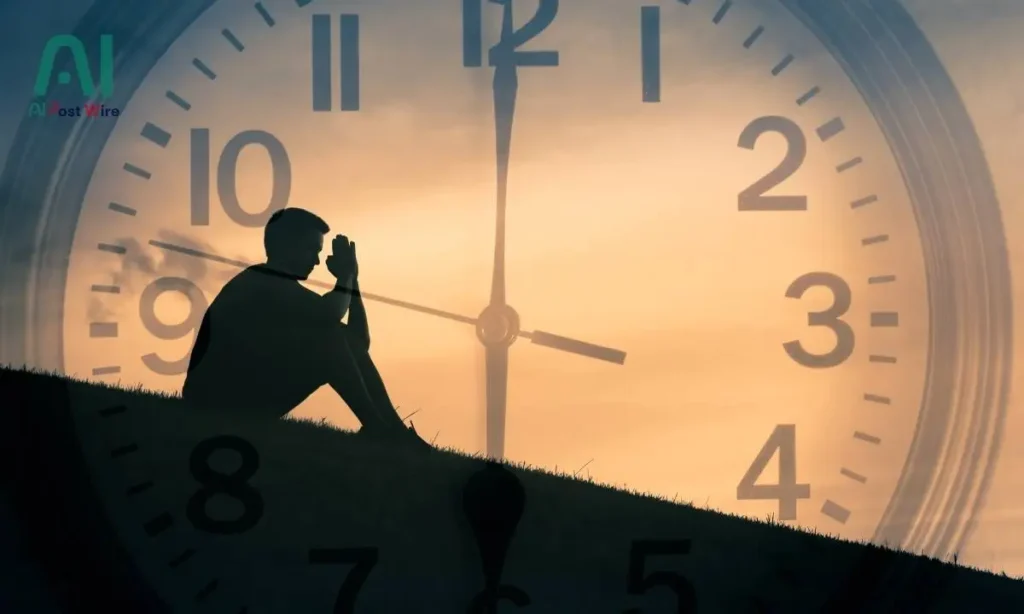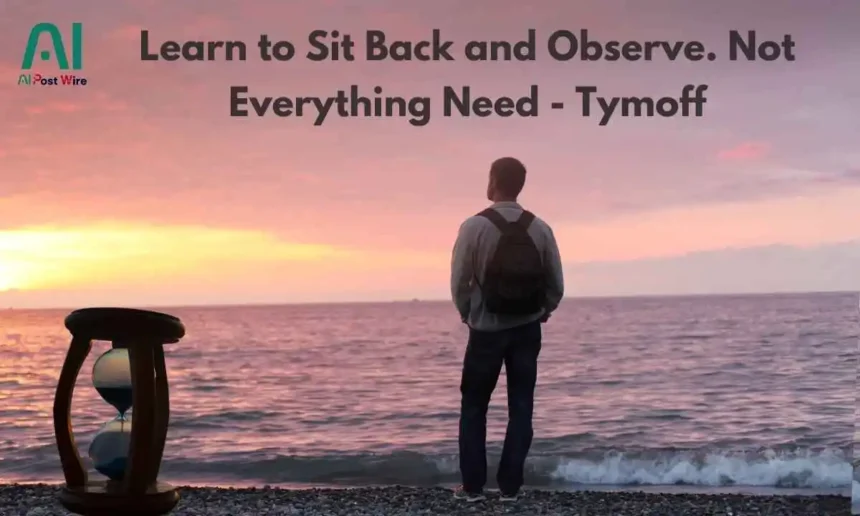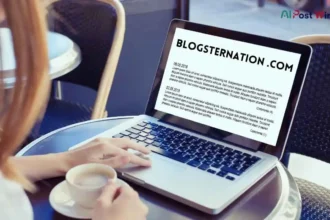Living in today’s fast world puts us into situations involving constant information, opinions, and stimuli. We get notifications from social media, emails from work, or casual conversations at the watercooler that make our heads nod before we allow ourselves to come and sit. Such fast reaction without time to pause and reflect on ourselves may easily lead to stress, misunderstandings, and exhaustion of emotions. But the more stringent approach could bring so much peace and sense to our lives: learning how to sit back and watch. This practice sums up very well the expression that says “Learn to sit back and observe. not everything need – Tymoff” Sometimes, the most effective response would be no response at all.
Importance of Observations in Daily Life
Observations are underrated skills which can make an immense difference in the quality of our personal and professional life. It’s, in fact, through it that all our avenues to attain insight into certain situations, behaviors, and environment are unveiled without causing any emotional outbreaks. Observing leads to disconnection from the rush of the moment, taking time off while executing, hence allowing one to gain insight into the bigger picture as he or she goes about it with patience, understanding, and rational decision-making.
Why Do We Have to React?
Now, before we start elaborating on the benefits of reeling in and observing, we must know why we seem to react in the first place, and there are countless reasons for this tendency, so here are a few:
- Emotional attachment: As long as we have an emotional attachment to any happening, there arises an urge to react to the same.
- Validation by society: Now that we all realize that social media does indeed affect our societies where we respond for validation or attention by others.
- Fear of being unheard: Sometimes, responding is the only way through which we ensure our voices are heard or our opinions seen.
- Lack of patience: Since we so constructed the culture and traditions around instant gratification, the idea of waiting or reflecting becomes unbearable.
Even though these reactions are human, they hardly ever productive. A miscommunication, argument, or mountain of issues can even escalate as a result of somewhat careless response.
Benefits of Being Able to Sit Back and Observe
Learning how to observe rather than react at once will help with many positive aspects of thinking clearly and having peace of mind. Here is why it may just be a lifesaver:
1. Reduces Stress and Anxiety
In case you want to respond to everything, unnecessary stress takes place. Sit back and observe so that you can detach from the emotional charge of the moment and give your mind breathing space to process information calmly. This way, you reduce the tension most reactions carry with them.
2. Enhances Decision Making
Observations in life would allow gathering information about a decision. Unlike rush judgments, they allow weighing the pros and cons and considering various perspectives before entering the situation on a more logical basis. All these lead to better, well-informed decisions at both personal and professional levels.
3. Improved Emotional Intelligence
You tend to understand the motivation, feelings, and behaviors of those whom you observe. This enhances the emotional intelligence in you, which makes you empathize with people and situations better. Over time, this can be an improved relationship that can make you more compassionate and understanding.
4. No Regretting Ends
Sometimes, acting too fast can be worded or acted upon that might haunt you later. Making sure you leave room to watch and reflect will keep you from acting in ways that may bring long-lasting effects in your life. The space between stimulus and response is where wisdom resides.
5. Encourages Mindfulness
Sitting back and just observing becomes mindfulness. It forces you to be in the present while not judging what is happening simultaneously, thus letting you experience the moment without becoming overwhelmed. It increases mental clarity and aids in developing a more peaceful mental state.
How to Practice Sitting Back and Observing
It’s an easy theory, but sitting back and watching is not quite so easy, especially if you always act on instinct. Here are some practical tips to get you started:

1. Pause before responding
The next time that urge to react to a situation calls, freeze. Take time-out-by counting to ten, taking a deep breath, or getting away from the situation. You will find space to collect your thoughts and respond with a clearer head.
2. Active Listening
Through practicing active listening, one of the best ways one develops observation skills. Do not plan responses as they talk because that’s not listening. Try to observe their word, tone, and body language. With this, you will be able to understand what goes on in your head from your friend’s point of view.
3. Reflect on Your Emotions
Take time to reflect before reacting. Ask yourself: “Why am I feeling this way? Is my reaction justified?” Self-awareness of emotions gives you a better handle over how you react to situations.
4. Practice Non-Attachment
Non-attachment does not mean apathy; it simply makes you realize that not everything is worth your emotional involvement. Through this non-attachment, you open yourself to witness things without necessarily getting too entangled up with their consequences. This mental transformation will free you from the urge to act uncontrollably.
5. Meditate Daily
Meditation is considered one of the very effective ways in which one can easily build up the observing without reacting habit. It trains a mind for focus increases consciousness and keeps grounding it to present moments. Even just a few minutes a day of meditation are creating huge differences in how you approach life’s challenges.
When to React and When to Observe
Besides learning the skill of sitting back and waiting, you also have to know when a reaction will be important. This is where the following guidelines can help you decide whether to watch and wait or take some action in the following situations.
- When to Observe: In conflicts or emotionally charged situations where you may not have all the information. Give yourself time to gather facts and reflect on the situation impartially.
- When to Respond: Any situation calling for an immediate response, for instance, during an emergency or when one’s belief is being challenged. Here too, be sure that your response is well-balanced and considered and not reactive.
Conclusion: How Observational Strength Works
In a world craving continuous involvement, something quick response to hurry, knowing how to sit back and observe will suffice to transform someone’s life. This makes you more transparent emotionally, reduces your stress level, and you become a better decision-maker. Remember that not everything deserves a reaction from you. Sometimes, the best response is no response. And through mindfulness, patience, and observing what may emerge, you can climb life better with a clearer mind and a more peaceful heart.
Also read about: Pedrovazpaulo Coaching
FAQ on Learn to sit back and observe. not everything need – tymoff
1. Why should one sit back and not react?
It is a need because observation brings us the power to gather more information, deal with emotions, and even wise decision-making. A reacting impromptu may end up in misunderstanding or even committing a mistake while setting back and reflecting upon helps turn out a wiser response.
2. How does someone practice sitting back and observing in daily life?
Begin by practicing non-response, or at least delayed response, before you respond to anything. Take a deep breath in, listen attentively, and work through your emotions. You may also begin your practice of meditation or mindfulness to help develop the skill of not responding right away.
3. What are the benefits of avoiding a reaction to any given circumstance?
But among the added benefits of not reacting to everything is the reduction of stress, enhancement of decision making, and developing one’s emotional quotient. And the other benefit is to avoid unnecessary conflicts and remain as calm as possible even in the most trying of situations.
4. When should I watch and when does it become important to respond?
When you are likely to feel in any emotionally charged situations, or when you don’t have all the information, don’t respond. But do respond when it is a time to react-in emergency, or in violation of a value-but even then, take your time.







